Right Groups Urge UN Human Rights Council To Convene On Iran
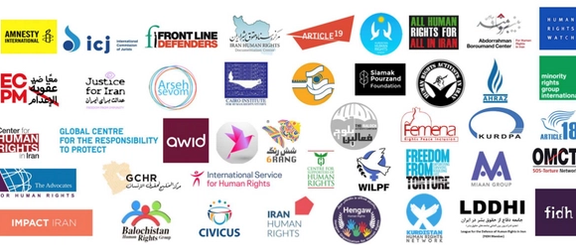
A group of 43 civil and human rights organizations and NGOs have called on UN Human Rights Council to hold a special session on ongoing rights violations in Iran.

A group of 43 civil and human rights organizations and NGOs have called on UN Human Rights Council to hold a special session on ongoing rights violations in Iran.
In a joint statement on Monday, they expressed deep concerns about the Iranian authorities’ mobilization of their well-honed machinery of repression to ruthlessly crackdown on the current uprising, sparked by the death in custody of 22-year-old Mahsa Amini.
Stressing the urgency for the establishment of an independent, investigative and accountability mechanism, they said The United Nations Human Rights Council should act promptly considering the gravity of crimes under international law and other serious human rights violations committed in Iran and the prevailing systemic impunity.
According to evidence gathered by a number of the signatories of the statement, there is a harrowing pattern of Iranian security forces deliberately and unlawfully firing live ammunition and metal pellets, including birdshot, at protesters and bystanders including children.
Voicing concerns over the growing numbers of protesters and bystanders killed, they said the number of casualties is likely to be much higher than the reported 200 deaths, including at least 23 identified children.
Since 18 September 2022, over one thousand protesters, human rights defenders, civil society activists, journalists, university students and school children have been arbitrarily arrested and detained, some already charged with “acting against national security,” describing the “cycle of deadly repression” alarmingly similar to previous waves of mass protests including in December 2017-January 2018, November 2019, July 2021, November 2021 and May 2022.
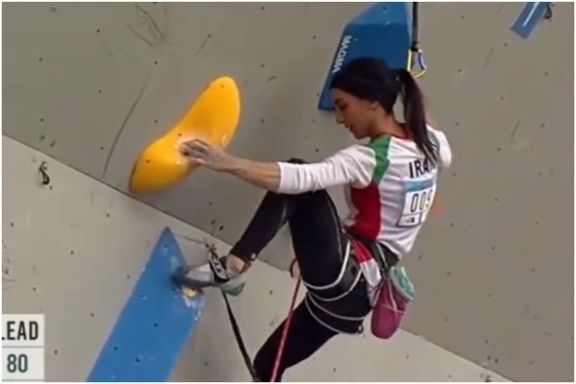
Iranian athlete Elnaz Rekabi who represented Iran at the Asian Climbing Competitions finals in Seoul, competed without hijab, disobeying the Islamic Republic's restrictions for female athletes.
Rekabi, 33, made the symbolic gesture in support of anti-hijab and antigovernment protests that have been raging across the country since mid-September, when 22-year-old Mahsa Amini was killed in custody of hijab police.
Her move prompted widespread reactions from Iranians and foreigners, while people on social media are organizing a huge gathering to welcome her early on Wednesday morning when she is scheduled to arrive back in the country. People are worried that she would be arrested upon arrival. According to reports, the authorities have moved to transfer Rekabi to Tehran ahead of schedule so people cannot gather for her arrival.
Moved by Rekabi’s act of defiance, activists and social media users are praising her move as a “Very powerful statement” that may bring about serious repercussions for her from the authorities.
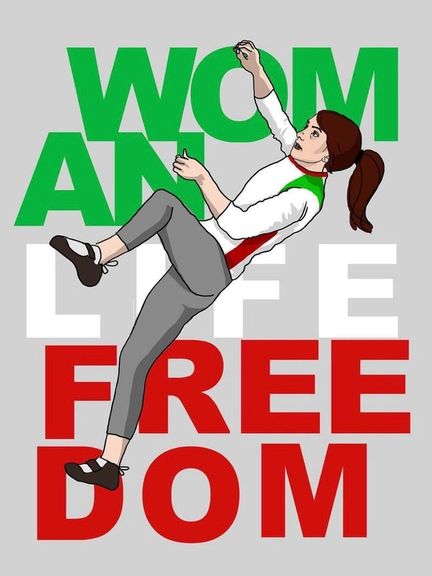
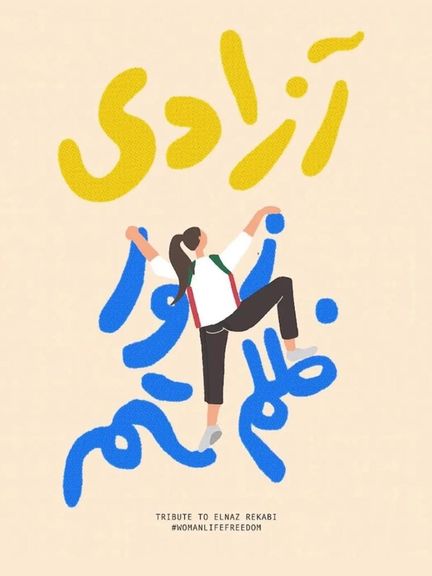
She previously won a bronze medal for boulder climbing at last year's competition and she has won more than 80 medals over the course of her career.
In 2019, boxer Sadaf Khadem attended a boxing match with the Iranian flag and without a headscarf. She had to cancel her return flight to Tehran after a warrant was issued for her arrest.
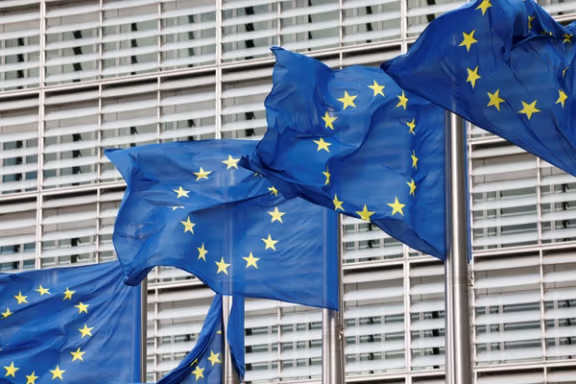
The Council of the European Union has imposed sanctions against 11 Iranian individuals and four entities for their role in the death of Mahsa Amini and the crackdown on the ongoing protests.
The European Council, the institution that defines the general political direction and priorities of the European Union, added on Monday 11 individuals and four entities to the EU list of those subjected to restrictive measures in the context of the existing Iran human rights sanctions regime, a statement released Monday said. The EU list now comprises a total of 97 individuals and eight Iranian entities.
"The EU and its member states condemn the widespread and disproportionate use of force against peaceful protestors. This is unjustifiable and unacceptable. People in Iran, as anywhere else, have the right to peacefully protest and this right must be ensured in all circumstances," the statement read.
The latest measures consist of a travel ban and an asset freeze, in addition to prohibiting EU citizens and companies from making funds available to the listed individuals and entities.
The sanctions also include a ban on exports to Iran of equipment which might be used for the repression of protests and of equipment for monitoring telecommunications and surveillance.
"The EU expects Iran to immediately stop the violent crackdown against peaceful protesters, to free those detained, and to ensure the free flow of information, including internet access. Furthermore, the EU expects Iran to clarify the number of deaths and arrested," the EU said.
The new designations include Iran’s so-called ‘Morality Police’ and two of its key figures, Mohammad Rostami and Haj-Ahmad Mirzaei. In addition, the EU has designated Iran's police, known as the Law Enforcement Forces, as well as several of its local chiefs for their role in the crackdown on the protests.
The EU has also sanctioned the minister of information and communications technology, Issa Zarepour, for shutting down the internet to restrict access to information on the protests and impede communication among protesters.
Announcing “unanimous” decision to take action against those “responsible for the death of Mahsa Amini and violent repression of peaceful protests” in a tweet Monday, the EU Foreign Policy Chief Josep Borrell stressed that the EU will always act against serious human rights violations.
Borrel also said on Monday that he currently did not expect progress in negotiations over reviving the 2015 nuclear deal with Iran. "I don't expect any move, that's a pity because we were very, very close," he said.
Iran-European Union relations have soured with claims Tehran has supplied Russia with armed drones used in Ukraine, although the EU is not yet expected to agree new sanctions.
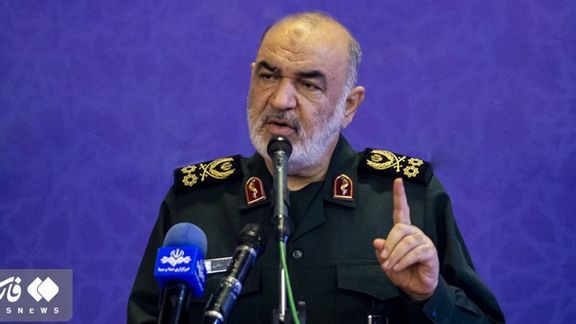
Commander of Iran’s Revolutionary Guard Hossein Salami has threatened Riyadh over the coverage of nationwide protests in Iran by the media it allegedly controls.
Salami claimed that Saudis are trying to provoke the Iranian youth, threatening that if they do not control their media the consequences will be unavoidable.
Speaking at a wargame staged by the IRGC ground forces near Aras region in the northwest of Iran, he said Saudis are seeking to “deceive Iranian youths by some media.”
“This is our last warning, because you are interfering in our internal affairs through these media, we told you, be careful,” added Salami.
He further said that Iran’s policy with neighbors is based on “friendship and good neighborliness” as well as “correct political interaction,” but if the neighbors endanger the security of the Iranian nation and country, Tehran’s policy will change too.
Salami’s statements are the last among several threats by the Iranian regime officials against the Persian-speaking media based outside the country like the BBC Persian, Manoto TV, Iran International and the VOA.
This comes as the clerical regime is constantly threatening families and relatives of the correspondents of these networks who reside in Iran and jams satellite television signals to limit access to their programs.
Many journalists and media activists have also been arrested in Iran after the new wave of anti-regime protests in a move to suppress the circulation of information.
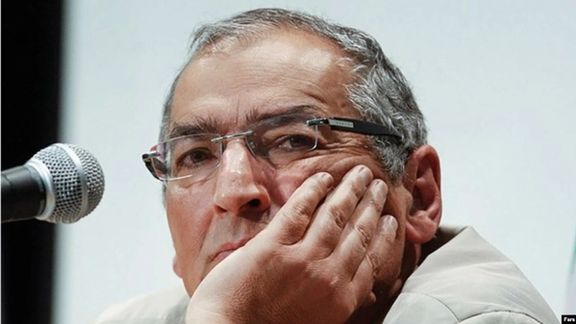
Sadegh Zibakalam, a former revolutionary who has become an outspoken citric of hardliners in Iran, has said the ongoing protests have startled the Islamic Republic's authorities.
Zibakalam, who has been recently banned from teaching at University of Tehran for his frequent berating remarks against the government, said in an interview on Sunday that the sheer volume of the protests has surprised everyone, including the statesmen and those who are serving in the government, parliament and the judiciary.
The ‘reformist’ analyst said that the officials are not sure how to react to such a huge uprising and are confused due to a lack of appropriate responses.
The political science university professor added that he himself is surprised by the big role of universities in the protests, noting that even students andprofessors ofnumerous branches of Azad University – who usually do not participate in antigovernment rallies – have beentaking part in the nationwide demonstrations.
Stressing that he does not want to "ignore the economic problems," he said the main cause of the current wave of protests is the hatred against the so-called ‘morality’ police or hijab enforcement patrols. "The fuel and ammunition of these protests is social discontent," he added, noting that women and Generation Z are the two main groups of protesters.
The uprising was ignited over the death in custody of 22-year-old Mahsa Amini and protest rallies first erupted in her hometown Saqqez and capital Tehran and soon spread to all over the country, garnering support from Iranian expatriate communities around the world as well as foreign governments and officials.
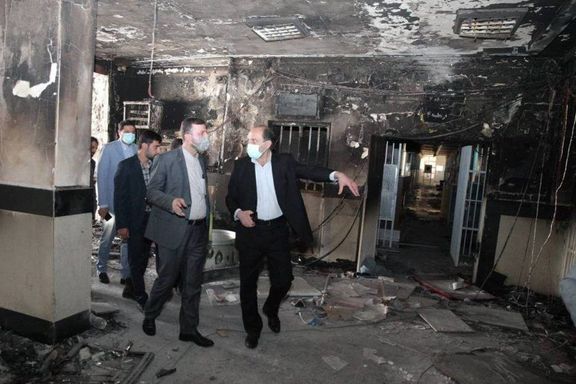
The Iranian Judiciary's news agency says the number of deaths from the fire which broke out at Tehran’s Evin prison on Saturday evening has now risen to eight.
According to the Judiciary, four more prisoners, who were in critical condition in hospital, succumbed to their injuries to bring the death toll to eight.
The Monday report has not mentioned the cause of the new deaths while on Sunday it said the first four lost their lives due to inhaling smoke.
The identities of the deceased have not been revealed yet, but the hard-liner Judiciary says they were theft-related convicts.
There is no chance in Iran for any independent investigation as to how the blaze started and exactly how many prisoners were killed. The Judiciary is a political institution fully at the service of the ruling elite, directly under Supreme Leader Ali Khamenei's control.
The large fire at the notorious prison began on Saturday evening, leaving tens of prisoners wounded while gunshots and blasts were also reported.
The prison fire infuriated the anti-government protesters once more with university students chanting slogans saying Evin had turned into a slaughterhouse.
The Evin fire caused global reactions soon after. EU foreign policy chief Josep Borrell said on Sunday that Iranian authorities are responsible for lives of all detainees, including human rights defenders and EU nationals.
German Foreign Minister Annalena Baerbock also said, “The government of Iran bears responsibility for all those imprisoned in Tehran's Evin Prison, including many political prisoners and demonstrators.”
Meanwhile, the number of signatures in an online campaign aimed at the leaders of the seven industrialized countries of the world, G7, has reached the 200 thousand mark. The petition calls on these countries to recall their ambassadors from Iran and expel diplomats and officials of the Islamic Republic.
Initiated by Kaveh Shahrouz, a lawyer and human rights activist living in Canada, on October 13, the campaign also demands the release of inmates from Iranian prisons.
However, reports from Iran show that the regime is still getting prepared to crack down on the protests and strikes. Following a strike and call for protests by the workers of Haft-Tappeh sugar factory in the southern oil-rich Khuzestan province, it was reported that the employer's agents are attempting to create division among the workers to prevent any gatherings.
However, the workers’ unofficial union social media channel has called on members to be alert and participate in a protest on Tuesday morning.
Iran’s oil workers last week joined the anti-regime protests. Workers of refineriesin southern oil-rich provinces of Bushehr, Khuzestan and Hormozgan such as Abadan Refinery and the petrochemical facilities in Asalouyeh, off the coast of the Persian Gulf, have been on strikes since last Monday.
This comes as the uprising of Iranians against the clerical regime draws more support from the diaspora and the international community.
In one of the latest reactions, the famous American pop star Britney Spears has expressed support for the protests. “Me & my husband stand with the people of Iran fighting for freedom,” Spears wrote on her Twitter account on Sunday.
The pop star's tweet came after her Iranian-American husband Sam Asghari, condemned the Iranian regime as "terrorists" last month.